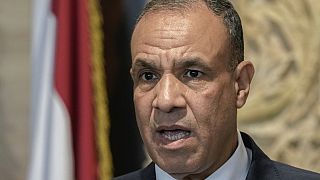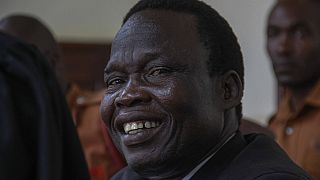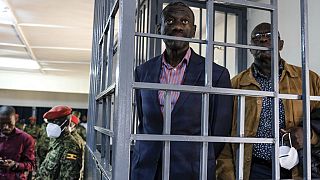Uganda
Construction is underway on the East Africa Crude Oil Pipeline (EACOP) and Tilenga well drilling project, as Uganda hopes to begin extracting its own oil in 2025.
A 1.443-kilometre long heated pipeline from the shores of Lake Albert in Uganda to the port of Tanga in Tanzania were jointly developed by French TotalEnergies and the China National Offshore Oil Corporation (CNOOC) along with Ugandan and Tanzanian state oil companies.
While TotalEnergies and Ugandan authorities state that the vast majority of the project affected persons (PAPs) have been adequately compensated for the loss of their land, houses, fields and crops and improved their lives, some of the NGOs are claiming PAPs agreed to proposed compensations out of fear. Some that did not agree to sign have been taken to court by Ugandan government.
"For me it's not a bad project because it's changing people's lives. The first impact that I have seen, our youths in the village who were not going to school, they stayed at home and life was hard for them. But right now, because of the project, they have got jobs and got money." Stella Afoyocan, a farmer, part of PAPs affected by Tilenga project said.
Mixed results -
Local residents like Afoyocan say they have not all experienced the arrival of the oil companies in the same way, who have emphasized the economic impact of the project.
TotalEnergies has claimed that Tilenga will create 7,000 jobs in the Lake Albert region, and some residents have benefited from land buyouts and scholarships, while others have been taken to court for opposing the project. Emily Fwachan, a native of Buliisa district where the Tilenga fields are located, sold five acres of land to TotalEnergies for 25 million Ugandan shillings, or about 6,700 euros.
The company built a new house for the 54-year-old woman, and she used some of the money to buy a property and a motorcycle for her son, and establish a beekeeping farm to sell honey to oil workers. "I had more benefits than problems," she told AFP.
Joselyn Katusabe, 48, a single mother of six, received about $1,000 for selling a small plot of land where she grew cassava. With this money, she opened a small salon and paid school fees. Before the money quickly ran out. "Unlike the cassava farm (...), the salon gives me a daily income. Yet, it is not enough," she estimated.
- "Injustice" -
Scovia Aheebwa, one of 12 siblings, received a scholarship from the oil company that allowed her to complete her education.
"My parents have always struggled to pay school fees," said the 25-year-old, now a university graduate who teaches science at a renowned school in the capital Kampala. TotalEnergies says more than 200 students have benefited from the program.
Jealousy Mulimba Mugisha refused the compensation offer and was taken to court by the government for obstructing a state-sponsored project. The 51-year-old father of seven lost in the first instance but has appealed. He has no illusions.
"We lost but in Uganda, if you are poor, don't expect justice to be done," he says, claiming that some of his family members were "intimidated" into accepting a compensation offer of less than $1,000. "We can tell future generations that oil is a curse rather than a blessing," he said. "We will not accept injustice," said Geoffrey Byakagaba, a farmer who also refused the compensation offer.
The country has been ruled with an iron fist since 1986 by Yoweri Museveni, who had described the project as a major economic source.
- High" standards -
Philippe Groueix, Managing Director of TotalEnergies in Uganda, assures us that there will always be detractors, but that, on the whole, the response to the compensation was positive.
"There is a debate on this project, whether it is done in an exemplary way, socially, environmentally. Our answer is yes," he told AFP, saying the project met the "highest standards."
He also said he expected a favorable outcome for TotalEnergies at the end of the hearing Tuesday at the Paris court. The oil company says it has limited the number of wells inside the national park and designed the pipeline to minimize its impact on the environment.













01:12
Fears of environmental disaster following oil spill from Russian ships
00:54
Libya's National Oil Company declares force majeure after Zawiya Refinery suffers damage
Go to video
USA: McKinsey pays fine for corruption in South Africa
01:03
DRC launches case against Rwanda to the African Court of Human and People's Rights
01:00
Orano's Niger Uranium Mine Taken Over by Authorities Amid Rising Tension
01:03
Pogba’s brother, 5 others accused of extorting France star go on trial